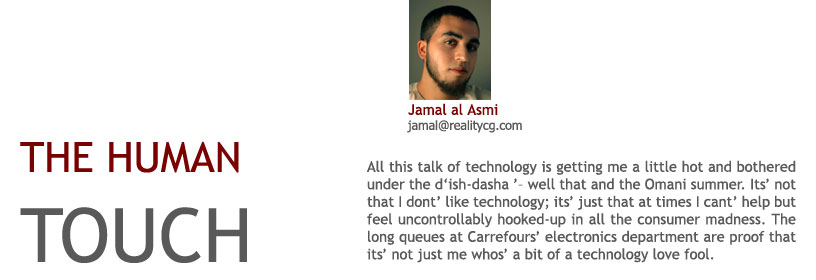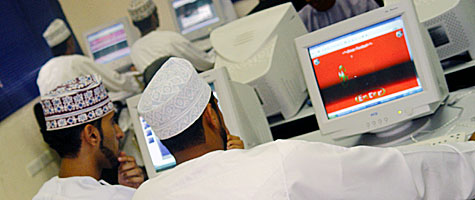Jamal Al Asmi, Production Manager, RealityCG – www.realitycg.com

Tech researchers, developers, marketers and ad-agencies the world over are realizing the importance of the ‘human element’ to help make that all-important connection with the neurological system that drives our impulses to buy more. This realization is being transferred to advertisements that get wedged under car windscreen wipers, splashed around magazines and broadcast across airways. Such efforts inspire the street conscious consumer to believe that you really do need to buy the newest mobile phone or the latest laptop to make life better. There’s no denying it either, digital toys are fast becoming man’s best friend. Sorry dog, you just lost your bone to my new ‘Aibo’.
Dogs that take photographs or help you send e-mails are more useful than the one’s that chew your sandals or dribble over your Persian rug. Our relationship with technology, although no old dog, has plenty of new tricks that urge us to keep climbing the upgrade path. The need to consume has much to do with the fact that our relationship with technology is changing; changing as quickly as the role of technology itself is being redefined.
Consider this. Those of us, who may have forgotten our mobile phone at home on our way to work five years ago, would have probably continued on our way. Today, we’re likely to turn around in heavy traffic to the sound of honking horns, just to get back to our precious. We all know too well that sinking feeling of having left it behind. The more time we spend in physical contact with technology, communicating through technology, and being offered ever-more useful tools, we will inevitably grow more reliant upon it. Considering the marvel that is the PDA, accomplishing all greatness in a space that a pile of diaries, phonebooks and notepads would be envious of, it’s not hard to see why living without one suddenly seems impossible. Perhaps the P in PDA really stands for pacifier?
There are no nicotine patch equivalents for these money suckers either, no 1-800 help-lines, and no cozy counseling centres. Instead, just more clever attempts to pry open your wallet to feed the habit. Getting sold another ‘gadget or add-on’ is not uncommon, even whilst on an innocent trip to the local shopping centre to buy nothing that even closely resembled a circuit board wrapped in plastic. Most malls have capitalized on this growing relationship we have with gadgets. Dozens of stores spotted around Muscat have been transformed into miniature museums that pay homage to the likes of Sony, Nokia and Motorola. It’s probable that this isn’t more than just a passing phase either. Judging by the increased spend on technology, it looks like our fluorescent floor-spaces are likely to continue being occupied by more things digital. Where there is demand, there will more than likely be supply.

Talking of plentiful supply, Aristotle’s a man who has probably supplied us with more philosophy than just about anybody else one can think of. So it would have been interesting, although impossible, to have his take on our blossoming relationship with technology. Instead, we’ll just have to extrapolate a line through his points. He once wrote that love is composed of a single soul inhabiting two bodies. Now look down at your mobile phone and think about that. Have we gone over the edge here? I am no love doctor, nor a psychologist but it doesn’t take long to realize that all the vital signs are there. Perhaps mobile phones and flash drives are filling more than our pockets?
Some reader’s hearts will differ no doubt. Some will lay claim to the fact that they don’t reside in the technology love camp at all, but sit safely on the other side of the fence where technology is all about function, not fussy form. They scoff at the adverts that talk of style and image consciousness and pride themselves in knowing that finding the right tool for the trade is a science. But let’s face it, even the ‘Engineer Star Trekkies’ among us know that slick latex uniforms & shiny gadgets can do wonders in even the most hostile of situations.
You don’t need to know calculus or even basic algebra to add up what technology is right for you, you just need to take a few cautionary steps. Consider these tips and in no time you’ll be seeing through some of the bluff that some suits call advertising:
- Consider what you actually NEED it for - Buy it for what you intend to use it for. Over specified gadgetry that has every single bell and whistle won’t necessarily translate to better ownership, just bigger bills. Does this ring a bell when considering your camera voice-recorder MP3 player WAP 3G enabled mobile phone? Right!
- Memory is important, isn’t it? If it serves me rightly, I believe most devices today require a memory that’s a little bit better than the average goldfish. More memory means you can store more information and multimedia, and essentially offers you useful space to use and play with. So make sure you get plenty of memory with your electronics. Whatever you do, don’t forget it.
- Don’t believe everything you read - Except this article of course. Product reviewers often have mutually beneficial relationships with their best friend the manufacturer, so make sure you get lots of opinions. Advertisers will always claim their product is the greatest thing since sliced bread. Use your loaf instead, read online user opinions and get informed.
- Trust your eyes and ears - It helps to have a feel and play with what you are considering buying. Ask colleagues, family and friends for their views. Visit the shop you are considering purchasing from and bug the sales person to let you have a hands-on demonstration.
- Buying the right product is more important than buying the product right – Forget being swooned by Mega Sales and 50% off stickers. Most of the time the salesman is going to give you that price if you’ve haggled right during non-sale periods. Besides, purchasing the product that’s right for you is more important than saving lots of money on the product that isn’t.
- Think long term – Not just how much usability your going to get from it after a couple of months, but what happens when it all goes wrong. Service support is important and will save you having to buy headache tablets when you drop your new found friend.
- Be aware of the fad – Just because every Talal, Ahmed, and Bader has one, doesn’t mean you need one too.
- New doesn’t mean better – The new model’s got a big price tag, offers something fresh to look at, but doesn’t necessarily give you the improved functionality. Don’t buy new for the sake of it, only if it really offers you something you need.
With a little foresight and a sprinkle of Digital Oman in your life, you’ll survive the consumer rush, but I can’t promise you won’t be tempted. Even while writing this column my computer has in the matter of a blink of an eye, sent a download request to a server located in California for the latest IT-talk radio programme, received the sound file wirelessly through my ADSL router, synchronized it with an MP3 player via an USB2.0, updated the play list on my hard drive and even alerted me that I’ve got something new I should listen to. All this, without a single bit of intervention on my part, and just in time for my evening walk too. Looks like I’ll be getting all hot and bothered under the dish-dasha again, only this time, it’ll be no fault of technology.








